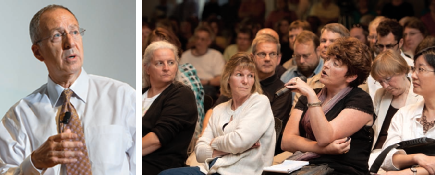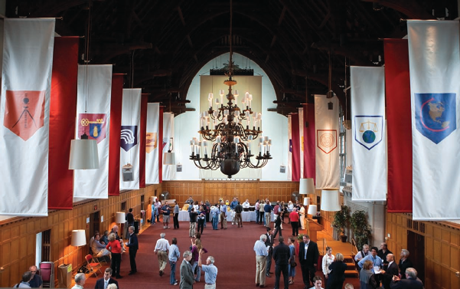Administration Holds Series of Strategic Planning Forums; Endowment Results Released; WVBR Donates Decades of Files to Archives; CU is Fifteenth in London Times Global Ranking; Freshman Class Is Most Diverse in Cornell History; Campus Continues Sustainability Efforts; Student Dies in Swine Flu Outbreak; Hundreds Fall Ill; Lab of Ornithology Collaborates on Art Installation; Corson Honored with Hans Bethe House Deanship; Alum Wins Nobel in Medicine; Wine and Vine Lab Opens in Western New York; Junior Dies in Car Accident; University and NYC Library Launch Partnership
Administration Holds Series of Strategic Planning Forums

President David Skorton and Provost Kent Fuchs hosted several open forums on campus this fall, seeking input from staff, faculty, and students as they craft a strategic plan for the University. With the goal of eliminating a projected $215 million budget deficit over the next five years, they said, task forces are examining ways to reorganize and streamline academics, while the consulting firm of Bain and Company is assessing reductions in administrative costs. "Everything is on the table," Skorton said of the process, dubbed "Reimagining Cornell."
At an employee forum, which drew more than 225 people, Skorton pledged that the plan's highest priority will be to protect jobs; recent belt-tightening has included a 7 percent reduction in personnel, one-third of it through layoffs. "I know you're picking up the slack," he told the audience. "We cannot continue to go forward just by telling everyone that you're going to work more and work harder, stay later, skip your lunch hour." Although raises were suspended this year, he announced that they will be reinstated next year—and pledged that the University will not be "taking a meat cleaver to benefits."
Some 200 people attended the faculty forum, where Skorton cited an academic aim for balancing the budget: "to return financial flexibility to the University so that we as faculty members can again pursue the initiatives, hiring, and projects that we want to—reaching our aspirations without concern that one more aspiration will require the decrease of spending or activity in another area." At a student forum, however, attendance was sparse: only a dozen showed up. "Your engagement is critical," Skorton told them. "That's not fluff."
Endowment Results Released
In September, the University announced that the value of its long-term investments (LTI) had declined 26 percent during the fiscal year that ended on June 30, 2009. This represented a slight improvement over the mid-year report of a 27 percent drop. The end-of-year value of the LTI—which includes the endowment and two smaller investment funds—was $5.1 billion, which is $1 billion less than its value on June 30, 2008.
Compared to the other Ivy schools, Cornell's investment performance was somewhere in the middle. Harvard's endowment dropped 30 percent (a loss of more than $10 billion) and Yale was down 29 percent, while Princeton declined 24 percent, Brown 23 percent, Columbia 21 percent, and Penn 16 percent.
The worst may be over, says James Walsh, the University's chief investment officer. "We have seen positive returns so far this financial year," he told the Daily Sun, "both from new investments made over the past eighteen months [and] also from a recovery in long-standing investments." For the first two months of the current fiscal year, Walsh's office reported, investment performance was up by 6 percent.
WVBR Donates Decades of Files to Archives
Pieces of Cornell's broadcasting history that have been in storage for decades are being made available to the public. WVBR is donating files dating back to the late Fifties to the Division of Rare and Manuscript Collections in Kroch Library. The materials include hundreds of transcripts and operational records, the work of such noted alumni as MSNBC anchor Keith Olbermann '79, and coverage of the 1969 Willard Straight Hall takeover.
CU is Fifteenth in London Times Global Ranking
The Times of London has put Cornell in fifteenth place on its list of the world's 200 best universities. Harvard took the top spot, followed by England's University of Cambridge, with Yale ranked third. Cornell was also rated number fifteen on the 2010 list of Best National Universities in U.S. News & World Report, falling one spot from the previous year. The University was rated second in the category of undergraduate engineering science/engineering physics programs, fifth in biological/agricultural engineering, sixth in economic diversity, and tenth in undergraduate business programs.
Freshman Class Is Most Diverse in Cornell History
The Class of 2013 is the most racially and ethnically diverse since the University began tracking such statistics in 1982, according to the latest numbers from the Office of Institutional Research and Planning. About 36 percent of freshmen identify themselves as "students of color," a 4 percent increase from the Class of 2012. Twenty percent report being members of an underrepresented minority: African American, Hawaiian/Pacific Islander, Hispanic, or Native American. The 3,221 entering students are evenly split between male and female; international students, representing some four dozen countries, comprise 11 percent of the class.
Campus Continues Sustainability Efforts
There was good news and bad on the environmental front this fall. In September, the University released its new Climate Action Plan—but in October, it learned that its grade for sustainability had fallen from the previous year. In 2008, the College Sustainability Report Card gave Cornell a B-plus; this year, the University earned a B. Its individual ratings included an A for administrative efforts toward sustainability and a C for green building.
Cornell's grade could well improve in the future given the new plan, which aims to cut carbon emissions to zero by 2050—and save hundreds of millions of dollars in the process. It outlines nineteen actions in five key areas: green development, energy conservation, fuel mix and renewable energy, transportation, and carbon offsetting. "It's a plan that is well thought out based on the economic climate we're in," says Kyu Whang, vice president for facilities services. The plan fulfills the American College and University Presidents' Climate Commitment that President Skorton signed in 2007.
Student Dies in Swine Flu Outbreak; Hundreds Fall Ill
The outbreak of the H1N1 virus on campus has drawn more than 700 students to Gannett Health Services and claimed the life of an undergraduate. Twenty-year-old Warren Schor '11, a CALS management major and member of Zeta Beta Tau fraternity from Clinton Corners, New York, died at Cayuga Medical Center in September.
The University has launched "You & The Flu," an education program on symptoms and prevention. Volunteers have assembled kits containing basic self-care supplies to allow patients to stay in their rooms to avoid infecting others, and students launched a "Got Soap?" campaign to encourage hand-washing. In a mass e-mail in September, President Skorton assured those on campus that "the public health
situation at Cornell is being well and ably ma
naged."
Lab of Ornithology Collaborates on Art Installation
 A new multimedia project by artist Maya Lin, creator of the Vietnam War Memorial in Washington, D.C., features audio and video recordings from the Lab of Ornithology. Entitled "What is Missing?," the project focuses on extinct and threatened species. The first part of the multi-site installation, unveiled in September at the California Academy of Sciences in San Francisco, is called "Lightning Cone"—a bronze and wood tube more than nineteen feet long containing recordings of species and their disappearing habitats. The lab's Macaulay Library is the world's largest archive of animal sounds and video; its staff consulted with Lin over the past two years.
A new multimedia project by artist Maya Lin, creator of the Vietnam War Memorial in Washington, D.C., features audio and video recordings from the Lab of Ornithology. Entitled "What is Missing?," the project focuses on extinct and threatened species. The first part of the multi-site installation, unveiled in September at the California Academy of Sciences in San Francisco, is called "Lightning Cone"—a bronze and wood tube more than nineteen feet long containing recordings of species and their disappearing habitats. The lab's Macaulay Library is the world's largest archive of animal sounds and video; its staff consulted with Lin over the past two years.

Banner year: Alumni of Sigma Phi fraternity's Cornell chapter have donated thirteen banners to hang in the Willard Straight Memorial Room, replacing a set they gave in 1990. Each banner bears the crest of a University college, including the Medical college campuses in New York City and Doha, Qatar.
Corson Honored with Hans Bethe House Deanship
A $2 million gift from trustee Robert Harrison '76 will endow the post of house professor and dean of Hans Bethe House; the position has been named in honor of Dale Corson, Cornell's eighth president. Corson, who served from 1969 to 1977, is credited by many with keeping the campus together in the wake of the highly divisive Straight Takeover. "I learned a tremendous amount about how large, complicated institutions are run from Dale Carson," says Harrison, chair of the executive committee of the Board of Trustees and CEO of the Clinton Global Initiative. Former Architecture, Art, and Planning dean Porus Olpadwala, MBA '73, PhD '79, who has served as house professor since the West Campus residence opened in 2007, will be the first to hold the endowed deanship.
Alum Wins Nobel in Medicine
Jack Szostak, who earned a PhD in biochemistry on the Hill in 1977, has won the Nobel Prize in medicine. A professor of genetics and molecular biology at Harvard Medical School, Szostak was one of three Americans honored for research related to cancer and the biology of aging; they'll share the $1.4 million award. They earned the Nobel for work on telomeres—caps on the ends of chromosomes—and an enzyme that forms them, telomerase. According to the Nobel citation, the three "solved a major problem in biology: how the chromosomes can be copied in a complete way during cell divisions and how they are protected against degradation."
Wine and Vine Lab Opens in Western New York
Replacing a lab it has operated since 1909, CALS has opened its new $5.4 million Cornell Lake Erie Research and Extension Laboratory. The facility, located in Portland, New York, is devoted to viticulture research in such areas as vineyard management and production systems, grape breeding, pest control, and mechanical harvesting. It includes fifty acres of prime grape-growing land, state-of-the-art equipment, classrooms, and meeting space. Portland is located 200 miles west of Ithaca.
Junior Dies in Car Accident
David Yang '11, a biological sciences major from Hillsborough, New Jersey, died in August in a car accident near Springfield, Missouri. Yang was the national chair of his fraternity, Lambda Phi Epsilon, a member of the executive board of the Chinese Students Association, and a member of the Cornell Asian Pacific Islander Students Union.
University and NYC Library Launch Partnership
Cornell and the New York Public Library have teamed up to create Cornell@NYPL, an educational program for city residents. Events will include offerings on health, nutrition, culture, and financial literacy, as well as 4-H youth programs, presented by faculty and Cooperative Extension staff at library locations throughout the city. For more information, visit blogs.cornell.edu/city.


